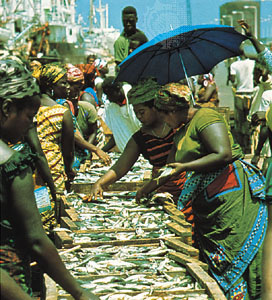Ghanaian Times | Friday, 17 September 2010
About 200 fishermen and fishmongers Thursday resisted attempts to clear debris and erect a fencewall around a fish processing area near the Tema Canoe Beach.
The area was being cleared for the construction of a palm oil processing firm to be owned by Wilmor Edible Oil Refinery-Project (WEORP) a Singaporean firm.
The 64 hectare land was leased to the company by the Ghana Ports and Harbours Authority (GPHA).
The demonstrators wearing red arm bands and headgears singing traditional songs with the refrain "wo kpene ni ashishi wo," to wit, "we will not allow them to cheat us," stopped the bulldozer from preparing the ground and sealed holes dug up to erect pillars for the fencewall.
They said that the project if allowed would throw them out of business as they use the area to dry and smoke fish especially anchovies.
Those undertaking the construction had to ran for cover and moved the bulldozer, trucks and the construction equipment into the TOA yard nearly to prevent the demonstrators from destroying them.
The police were called in later to maintain law and order, but those carrying out the construction had to abandon the work and took their equipment away, while the demonstrators hooted at them.
Rebecca Ashong, one of the fish processors, said she had been on the business for more than 15 years and had been supporting her family with proceeds from it and driving them out of the land will spell doom for them.
Wolenye Korkor Abo, said more than 2,000 people depended on the fish processing business for survival and displacing them will bring about untold hardship into the Tema Manhean community and asked government to take another look at it.
Nii Shippi Armah of the Tema Traditional Council wondered why the people of Tema would not be left alone to occupy this piece of land after so many acres of their land had been taken over by the State.
He said in 1959 when the construction of the Tema harbour and industrialisation of Tern a displaced the indigenous people, government resettled them at Tema Newtown.

In addition, government pointed the landing beach and this piece of land where our people could continue fishing processing their catch and mending nets as we did at our previous location.
He said "after almost 51 years of using the place, it has by convention and usage become ours".
He said over 2,000 people were involved in the fish processing business in the area and it is from that they support their families and children's education and sacking them would bring untold economic hardships. "We will, therefore, resist all attempts to displace us again," he warned.
Nii Shippi Armah said a committee set up to study the implications of the project to the community was yet to present its report to the Tema Traditional Council.
Richster Nii Armah Armarfio, secretary to the committee, said land utilisation plan sighted by the committee showed that only a small strip of land at the seashore had been reserved by the project for fish processing adding that it was not adequate.
He said this was far beyond the area discussed. But when contacted, Mr. Alex Asiedu, consultant to the project, said the 16.5 acre land had been acquired under a lease from GPHA who are the owners.
He said the $62 million project was endorsed by the government and it would convert crude palm oil into edible oil for local consumption and export.
Mr, Asiedu said over the last five months it had been meeting the committee members and they had agreed that those affected by the project will be relocated and the cost paid by the project so that their livelihood were not destroyed.
He said for instance, "it had been agreed that a fish processing platform will be built across the road near the lagoon where business can be done in a more hygienic manner.”
He said a new 50 seater toilet facility will be provided to replace the 40 seater one which is currently located at the centre of the land.
Mr. Asiedu said the concerns of the community were being addressed and the construction of the project would be carried out alongside the relocation plan and, therefore, advised those affected by the project not to panic.
The project is expected to directly employ between 1,800 and 2,400 people.












